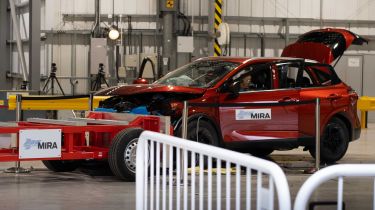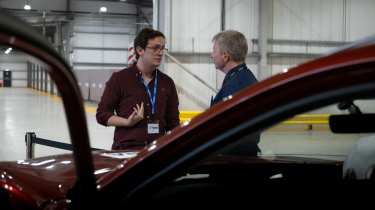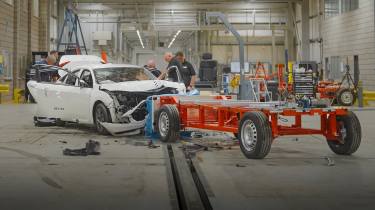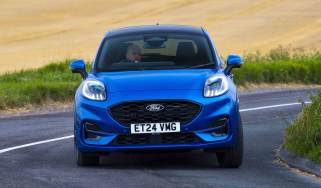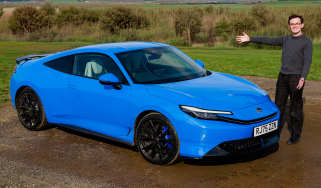Horiba Mira crash test hub: the UK’s most advanced car safety centre
We witness Euro NCAP’s “most exacting” crash test
When you bought your car, you were probably made aware of its Euro NCAP rating. The star-rating system accurately represents each model’s level of safety, and despite its European-sounding name, it actually originated in the UK in the mid-nineties as a project led by the Department for Transport.
In the three decades since, testing has become more stringent, with Euro NCAP introducing what it described as its “most exacting test ever” in 2020.
To see it in action, Auto Express was given exclusive access to the nation’s brand-new frontal car-to-car impact test lab at Horiba Mira in Nuneaton, Warwickshire, for a ‘crash course’ in how the UK intends to re-establish itself at the forefront of car safety. The crash testing laboratory at the facility opened in 1993 and has since carried out over 10,000 simulated impacts, but has never before been able to simulate a car-to-car accident.
Thanks to a £4.1million overhaul funded by Japanese parent firm, Horiba, that's now possible, with the main development being a 170-metre-long track that can catapult cars at speeds of up to 70mph into controlled crash tests, aided by a 1,600bhp winch.
Other improvements include new lighting and camera technology to accurately photograph each simulation for analysis. This puts the test centre in line for Euro NCAP accreditation, meaning UK manufacturers will soon be able to test their cars to the latest safety standards without having to send them abroad, as is currently the case.
The new track will be the key to Euro NCAP approval. It's an extension of the 85-metre one previously at the site, and required the construction of a substantial new building in which to house it.
The introduction of such a long track enables Mira to perform Euro NCAP’s latest MPDB (Mobile Progressive Deformable Barrier) test, which involves a test car and deformable barrier being fired into each other, both travelling at 50km/h (30mph), to understand how a car’s frontal impact structure distributes the force in an accident.
To demonstrate it, Horiba Mira sourced a Nissan Qashqai to act as the proverbial ‘lamb to the slaughter’. Chief Technical Officer Graeme Stewart took us round the Qashqai and pointed out how in each test, the company hooks up a number of sensors to measure different forces impacting on the car which, along with the photographs and damage to the deformable barrier, are analysed to provide the vehicle's safety score.
Sitting in the car was another of Horiba Mira’s latest investments: the THOR 50 crash test dummy. So futuristic it hasn’t been standardised yet as part of Euro NCAP’s tests, each of these units costs well over half a million pounds and contains many more sensors than previous dummies – primarily around the chest, pelvis and internal organs – to measure the load put on the body during an impact. Of course, unlike their human equivalents, these can undergo a crash several times before they need any sort of repair.
Perhaps the most remarkable aspect, though, is the accuracy of each test. “There are tight tolerances in terms of alignment,” Stewart explained. “The target speed here was 50km/h, and we achieved 50.1km/h – you’re allowed plus or minus 1km/h deviation, so that’s quite a result.” It's clear to see the pride on show among the centre's staff following the refit.
“The UK has never had this level of passive testing capability before,” added Stewart. “Opening our new Crash Facility is a landmark moment, allowing us to support all legislative and consumer standards, as well as the important vehicle development work that supports the global automotive industry’s bid to design safer vehicles.”
But do we still need physical crash tests, given developments in advanced computer simulation systems and artificial intelligence (AI), especially given how expensive each one is? According to Stewart, it’s a question of not only ethics, but also scientific variables. “You have to consider material strength, the density of seat foam, the way an airbag deploys – all of these can’t be represented on a computer model,” he said. “They get close, but you still need that physical test.”
Auto Express also spoke to Matthew Avery, Director for Strategic Development at Euro NCAP. “It’s great that, for the first time ever in the UK, we’ve got a facility that can perform the most exacting test Euro NCAP has ever undertaken,” he said. “Everyone has an obligation to be driving as safe a vehicle as they can – bear in mind that vehicles not only protect themselves in a crash but also other road users.”
While Horiba Mira's ability to provide UK manufacturers with the means to crash test their cars without the need to go abroad brings with it financial benefits, as well as being the subject of national pride, the new crash test facilities appear to be just the beginning for the company. It is also developing a brand-new sophisticated autonomous driving centre in which various scenarios can be simulated in order to properly evaluate advanced driver-assistance functions.
In addition, Horiba Mira's also planning to crash test lorries, with a focus on protecting other road users – primarily vulnerable car drivers.
Want the latest car news in your inbox? Sign up to the free Auto Express email newsletter...

